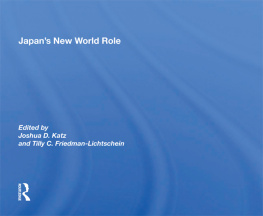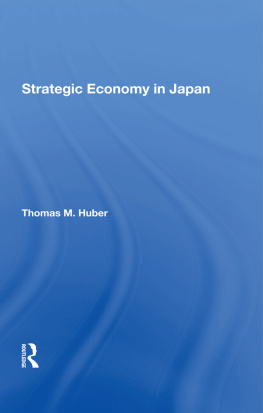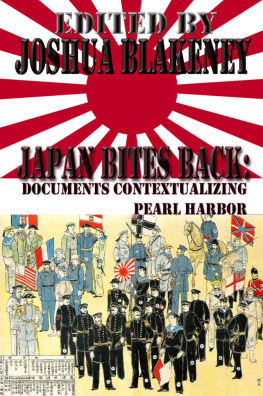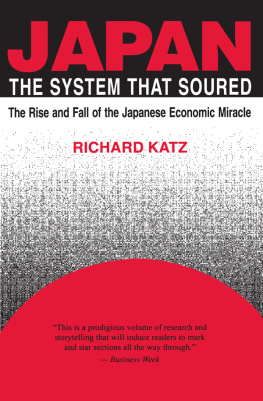Japan's New World Role
Other Titles of Interest
The Modernizes: Overseas Students, Foreign Employees, and Meiji Japan, edited by Ardath W.Burks
The Armed Forces in Contemporary Asian Societies, edited by Edward A. Olsen and Stephen Jurika, Jr.
Food and Development in the Pacific Basin, G. Edward Schuh and Jennifer McCoy
A Japanese Journalist Looks at U.S.-Japan Relations, Yukio Matsuyama
Japan's Foreign Relations: A Global Search for Economic Security, edited by Robert S. Ozaki and Walter Arnold
The Emerging Pacific Community: A Regional Perspective, edited by Robert L. Downen and Bruce J. Dickson
Japan: Profile of a Post Industrial Power (second edition), Ardath W. Burks
About the Book and Editors
Despite Japan's status as a global economic power and its position as the world's second-largest market economy, institutional, historical, and cultural factors have combined to limit Japan's political and military roles. In this volume, a reprint of a 1983 issue of the Journal of International Affairs (JIA), a group of prominent Japanese and American scholars address Japan's potential for an expanded world role and the responsibilities and policy choices entailed in becoming a truly global power. Some of the specific issues covered include East Asian regional security, international trade, and Japan' s relations with the United States, China, and the European Community.
Joshua D. Katz is managing editor of Financing Foreign Operations at Business International. He was formerly editor in chief of the Journal of International Affairs. Tilly C. Friedman-Lichtschein is managing editor of Political Science Quarterly. She was formerly managing editor of JIA.
Japan's New World Role
edited by
Joshua D. Katz and Tilly C. Friedman-Lichtschein
First published 1983 by Westview Press
Published 2018 by Routledge
52 Vanderbilt Avenue, New York, NY 10017
2 Park Square, Milton Park, Abingdon, Oxon OX14 4RN
Routledge is an imprint of the Taylor & Francis Group, an informa business
Copyright 1983,1985 by the Trustees of Columbia University in the City of New York
All rights reserved. No part of this book may be reprinted or reproduced or utilised in any form or by any electronic, mechanical, or other means, now known or hereafter invented, including photocopying and recording, or in any information storage or retrieval system, without permission in writing from the publishers.
Notice:
Product or corporate names may be trademarks or registered trademarks, and are used only for identification and explanation without intent to infringe.
Library of Congress Catalog Number 85-50889
ISBN 13: 978-0-367-00607-5(hbk)
Few would dispute the assertion that Japan's postwar recovery and rapid emergence as an economic superpower constitute one of the major transformations in the international system since 1945. Yet, despite the revolutionary changes that phenomenal growth and prosperity have brought about in the Japanese standard of living, Japan's role in international relations has not kept pace. An active world role demands not only a powerful economic base, but also a decision to allocate resources on a national scale toward particular international goais, as well as a choice of the specific means political, diplomatic, or militaryfor pursuing the desired ends. At the same time, the exercise of national power on the international scene requires a consciousnessat least among the policymaking eliteof the state as a global actor.
Observers of international relations have foreseen a gradual restructuring of the world system, away from the strictly bipolar confrontation between the Soviet Union and the United States of the 1940s and 1950s, toward a multipolar system in which Japan, China, and Western Europe would each make inroads into the relative strength of the superpowers. Until the recent resurgence of Soviet-American confrontation, it was widely hoped that detente between the superpowers, along with a general diffusion of world power, could engender a more stable world. While this vision may still prove viable in the long run, it has so far failed to supplant bipolarity, leading some to question its original premises.
One source of disappointment for advocates of multipolarity has been the slow pace with which Japan has assumed a responsible international political role commensurate with its status as the world's second largest market economy. Japan's current posture may appear paradoxical: Global in its economic outreach, as a major exporter to both industrialized and developing countries and as a resource-poor importer of primary products essential to its national survival, Japan remains insular in its belief that it cannot or should not project its power politically or militarily to pursue its economic interests in an independent way. Of course, there has indeed been a movement away from the postwar role of junior partner to the United States, as evidenced in diverging positions on the Middle East and certain East-West issues. There is also a growing awareness among Japanese leaders that Japan should in one way or another develop an active global policy, rather than merely reacting to foreign pressures and changing external circumstances. At present, however, there is no clear consensus on the road to be taken.
This paradox has been internalized, both by Japanese and foreigners. Perceptions tend to lag behind economic growth. Despite a renewal of national pride in Japanese economic accomplishments and demands that Japan be treated as a full member of the Western alliance, many Japanese still view their country as small and vulnerable, incapable of having a major impact on world politics. In an age which has witnessed the limitations of American power, the United States is still widely regarded in the framework of its postwar roleas a dominant senior partner on whom Japan should depend for its security and place in international relations. At the same time, there is a large body of Japanese public opinion which resents Japan's postwar dependence on the United States and would advocate a more independent course for the post- Pax Americana period.
Americans and Europeans, on the other hand, while in awe of Japanese economic successas clearly evidenced by the recent popularity of books on the "Japanese challenge" and business practiceshave only recently and reluctantly begun to open the door to full Japanese membership in the club of advanced industrial democracies. Japanese participation in "trilateral" economic and security cooperation is barely a decade old and still far from adequate, in view of the extensive shared interests and problems.
Developing nations, especially those which were victims of Japanese expanston and cobnialism prior to 1945, have understandably ambivalent feelings toward Japan. As proof that a non-Western nation can modernize and achieve prosperity, Japan is to be respected and even emulated. But such laudatory attitudes are in delicate balance with apprehensions over the potential for Japanese "economic imperialism" or even rearmament and renewed militarism.
Our authors have referred to these and other paradoxes in their discussions of the many aspects of Japan's global role. They have also seen distinguishing characteristics of the Japanese experience, which form the basis for Japan's relations with other countries now and will continue to do so in the future. Many of these are well known in their broadest outlines: Japan's frenzied efforts to resist Western colonialism by rapid modernization, its overriding concern with its perceived vulnerability, the legacy of postwar reforms under American occupation, and the "special relationship" that developed between Japan and the United States. Each article includes at least passing mention of the fundamental linguistic, cultural, and institutional differences separating Japan from the Western-oriented mainstream of international relations discourse. Such differences necessarily lead to a divergence of expectations in all spheres of international relations and can easily lead to conflict if not recognized and addressed.








